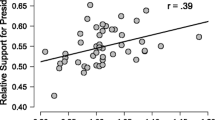Abstract
According to decision theory, the rational initial action in a sequential decision-problem may be found by ‘backward induction’ or “folding back’. But the reasoning which underwrites this claim appeals to the agent's beliefs about what she will later believe, about what she will later believe she will still later believe, and so forth. There are limits to the ‘depth’ of people's beliefs. Do these limits pose a threat to the standard theory of rational sequential choice? It is argued, first, that the traditional solutions of certain games depend on knowledge which exceeds depth limits, and that these solutions therefore cannot be shown rational in the usual sense. Then, for that related reason even ‘folding back’ solutions of one-person problems cannot be! A revision of our notion of rational choice is proposed, analogous to the reliabilist account of knowledge of Goldman and others, by which this paradox is resolved.
Similar content being viewed by others
References
Aumann, Robert: 1987, ‘Correlated Equilibrium as an Expression of Bayesian Rationality’, Econometrica 55, 1–18.
Bacharach, Michael: 1986, ‘The Problem of Agents' Beliefs in Economic Theory’, in M. Baranzini and R. Scazzieri (eds.) Foundations of Economics. Blackwell, Oxford, pp. 175–203.
Bacharach, Michael: 1987, ‘A Theory of Rational Decision in Games’, Erkenntnis 27, 17–55.
Bacharach, Michael: forthcoming, ‘Mutual Knowledge and Human Reason’, in C. Bicchieri and M. L. Dalla Chiara (eds.), Knowledge, Belief and Strategic Interaction, Cambridge University Press, New York.
Barenboim, C.: 1978, ‘Development of Recursive and Nonrecursive Thinking about Persons’, Developmental Psychology 14, 419–20.
Bernheim, B. Douglas: 1984, ‘Rationalizable Strategic Behavior’, Econometrica 52, 1007–28.
Binmore, Kenneth and Adam Brandenburger: 1988, ‘Common Knowledge and Game Theory’, mimeo, London School of Economics and Churchill College, Cambridge.
Cargile, James: 1970, ‘A Note on “Iterated Knowings”’, Analysis 30, 151–55.
Clark, H. H. and C. R. Marshall: 1981, ‘Definite Reference and Mutual Knowledge’, in A. K. Joshi, B. L. Webber and I. A. Jay (eds.), Elements of Discourse Understanding, Cambridge University Press, Cambridge, pp. 10–63.
Cubitt, Robin: 1989, ‘Refinements of Nash Equilibrium: a Critique’, Theory and Decision 26, 107–31.
Farquharson, R.: 1969, Theory of Voting, Blackwell, Oxford.
Fischoff, Baruch: 1982, ‘For those Condemned to Study the Past: Heuristics and Biases in Hindsight’, in Kahneman, Slovic and Tversky (1982), pp. 335–51.
Gärdenfors, Peter: 1984, ‘Epistemic Importance and Minimal Changes of Belief’, Australasian Journal of Philosophy 62, 136–57.
Gilbert, Margaret: 1989, ‘Rationality and Salience’, Philosophical Studies 57, 61–77.
Goldman, Alvin I.: 1976, ‘Discrimination and Perceptual Knowledge’, Journal of Philosophy 73, 771–91.
Goldman, Alvin I.: 1979, ‘What is Justified Belief?’, in George Pappas (ed.), Justification and Knowledge, D. Reidel, Dordrecht, pp. 1–23.
Grice, H. P.: 1957, ‘Meaning’, Philosophical Review 66, 377–88.
Grice, H. P.: 1969, ‘Utterer's Meaning and Intensions’, Philosophical Review 78, 147–77.
Hammond, Peter: 1976, ‘Changing Tastes and Coherent Dynamic Choice’, Review of Economic Studies 43, 159–73.
Hammond, Peter: 1988, ‘Consequentialist Foundations for Expected Utility’, Theory and Decision 25, 25–78.
Hintikka, Jaakko: 1970, ‘Knowledge, Belief, and Logical Consequence’, Ajatus 32, 32–47.
Hughes, G. E. and M. J. Cresswell: 1968, An Introduction to Modal Logic, Methuen, London.
Kadane, J. B. and P. D. Larkey; 1982, ‘Subjective Probability and the Theory of Games’, Management Science 28, 113–20.
Kahneman, D., P. Slovic and A. Tversky (eds.): 1982, Judgement under Uncertainty: Heuristics and Biases, Cambridge University Press, Cambridge.
Kreps, D., P. Milgrom, J. Roberts and R. Wilson: 1982, ‘Rational Cooperation in the Finitely Repeated Prisoner's Dilemma’, Journal of Economic Theory 27, 244–52.
Kreps, David and Robert Wilson: 1982, ‘Sequential Equilibria’, Econometrica 50, 863–92.
Lewis, David: 1969, Convention: A Philosophical Study, Harvard University Press, Cambridge.
Lewis, David: 1975, ‘Languages and Languages’, in K. Gunderson (ed.), Minnesota Studies in the Philosophy of Science, Vol. VII, University of Minnesota Press, Minneapolis, pp. 3–35.
McClennen, Edward F.: 1985, ‘Prisoner's Dilemma and Resolute Choice’, in R. Campbell et al. (eds.), Paradoxes of Cooperation and Rationality, British Columbia University Press, Vancouver, pp. 94–104.
Monderer, Dov and Dov Samet: 1988, ‘Approximating Common Knowledge with Common Beliefs’, Games and Economic Behavior 1, 170–90.
Nagel, Ernest: 1961, The Structure of Science, Routledge and Kegan Paul, London.
Nozick, Robert: 1981, Philosophical Explanations, Clarendon Press, Oxford.
Pearce, David: 1984, ‘Rationalizable Strategic Behavior and the Problem of Perfection’, Econometrica 52, 1029–50.
Radford, Colin: 1966, ‘Knowing and Telling’, Philosophical Review 75, 326–36.
Raiffa, Howard: 1968, Decision Analysis, Addison-Wesley, Reading.
Rubenstein, Ariel: 1989, ‘The Electronic Mail Game: Strategic Behaviour under “Almost Common Knowledge”’, American Economic Review 79, 385–91.
Savage, Leonard J.: 1954, The Foundations of Statistics, Wiley, New York.
Schiffer, Stephen: 1972, Meaning, Oxford University Press, Oxford.
Smith, Holly M.: 1991, ‘Deciding to Decide: Is There an Infinite Regress?’, in Michael Bacharach and Susan L. Hurley (eds.), Foundations of Decision Theory, Blackwell, Oxford, pp. 194–219.
Strotz, R. H.: 1955–56, ‘Myopia and Inconsistency in Dynamic Utility Maximization’, Review of Economic Studies 23, 165–80.
Tan, T. and S. R. C. Werlang: 1988, ‘The Bayesian Foundations of Solution Concepts of Games’, Journal of Economic Theory 45, 370–91.
Von Neumann, John: 1958, The Computer and the Brain, Yale University Press, New Haven.
Von Neumann, John and Oskar Morgenstern: 1944, Theory of Games and Economic Behavior, Princeton University Press, Princeton.
Zermelo, E.: 1912, ‘Über eine Anwendung der Mengenlehre auf die Theory des Schachspiels’, Proceedings of the 5th International Congress of Mathematicians 2, 501–10.
Author information
Authors and Affiliations
Additional information
I am grateful for comments on precursors and earlier drafts to David Canning, Robin Cubitt, Elizabeth Fricker, Alvin Goldman, Alan Hamlin, Isaac Levi, David Lewis, Teddy Seidenfeld, Hyun Song Shin, and the referees.
Rights and permissions
About this article
Cite this article
Bacharach, M. Backward induction and beliefs about oneself. Synthese 91, 247–284 (1992). https://doi.org/10.1007/BF00413569
Issue Date:
DOI: https://doi.org/10.1007/BF00413569




